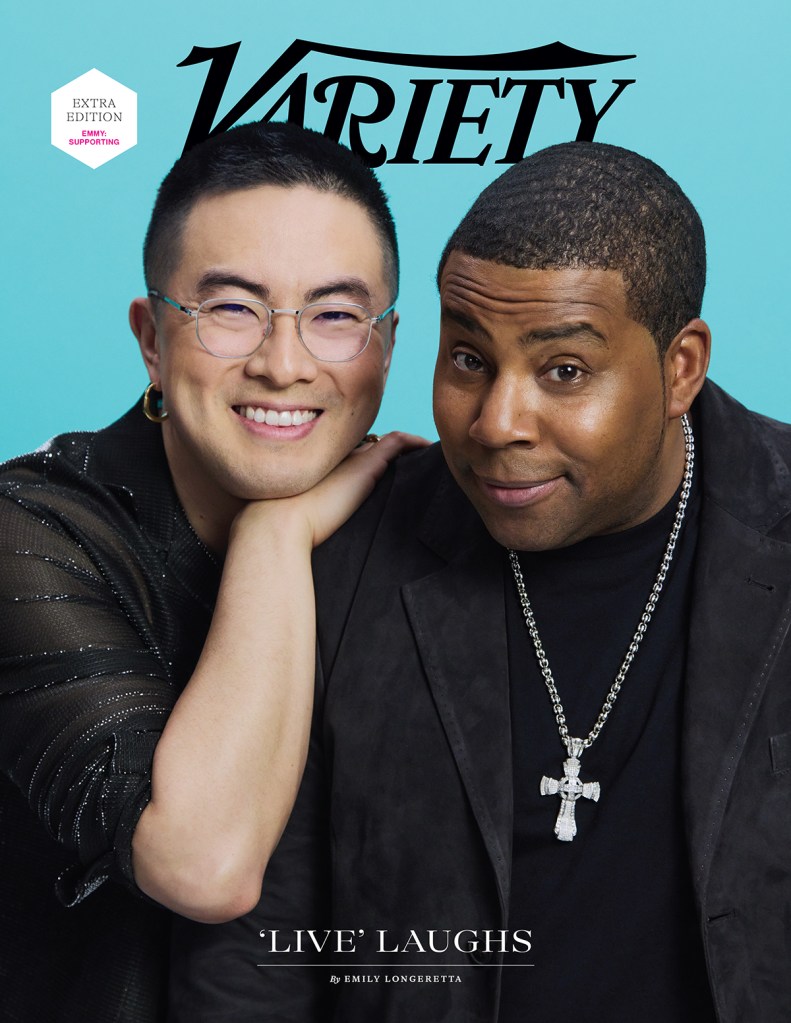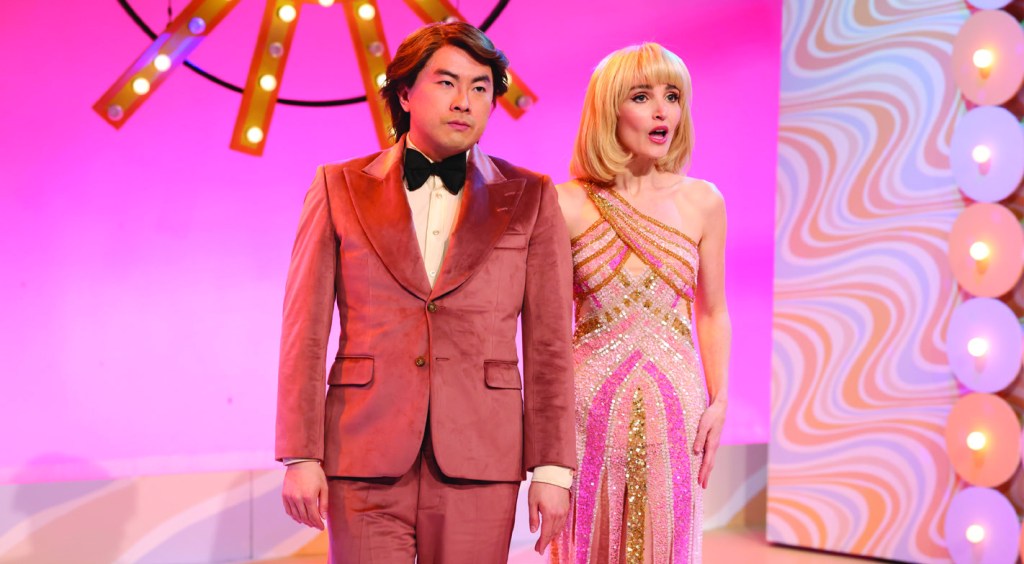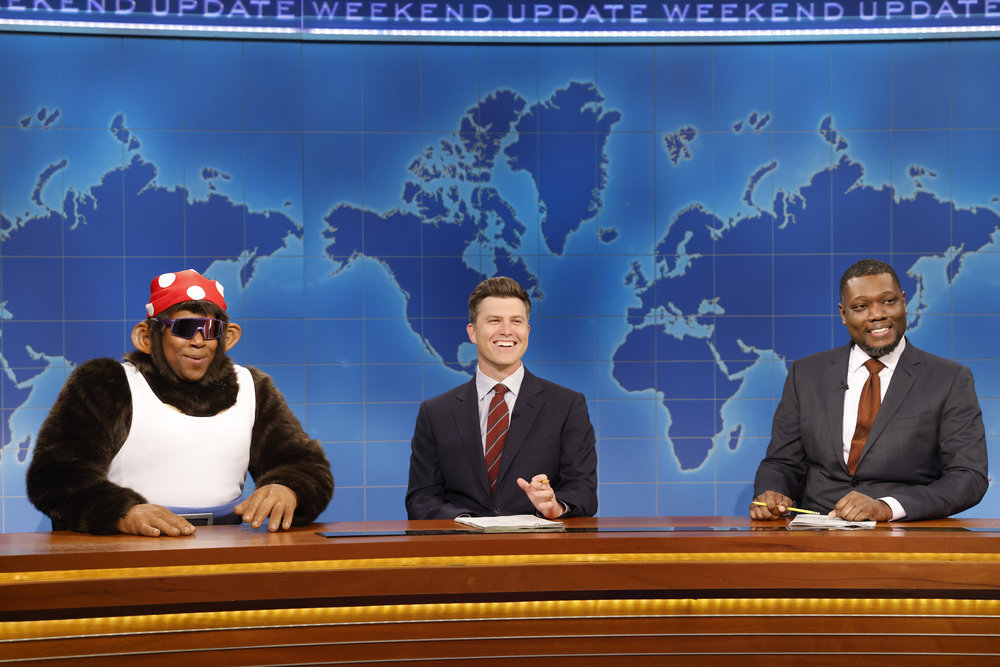Kenan Thompson and Bowen Yang had very different trajectories on “Saturday Night Live.” And yet, they both made history. Thompson, who joined the series in 2003, is the longest-serving cast member in the show’s history. When Yang joined, first as a writer in 2018 and then as an actor the following year, he became the first Chinese-American player on “SNL.”
Although they joined the show 15 years apart, they adapted the same way: by listening.
Thirty years ago, Thompson attended the premiere of “All That,” the children’s version of “SNL” that aired on Nickelodeon in the 1990s. “Kenan’s presence on the show now is just a sign that he has the foresight, courage and patience to be a pure master in this field,” Yang said. He turned to his co-star: “I don’t take sitting next to you at the reading for granted. I absorb so much just by being nearby.
Thompson is flattered, but he also understands. “That’s how I felt when I started. It was Jimmy Fallon and Tina Fey. And then, go down the list: Amy Poehler, Maya Rudolph, Rachel Dratch, Will Forte, Fred Armisen. Before, I would sit and watch. It was all about participating and learning the timing,” he says. “I learned a lot from watching, especially Maya. Jesus Christ, I’ve never seen anyone so versatile.
Right now, everyone is focused on the upcoming 50th season of “SNL.” But Yang and Thompson agree that 49 is just as important — “if not more,” Thompson says. The season started off strong, with the return of former cast member Pete Davidson as host.
Thompson can’t help but gush about how “proud” he is of Davidson, especially since his personal life is always in the media. “It’s not easy to be constantly under this surveillance. I have the impression that this is the most monitored period on the planet,” he says. “Everyone watches everything and comments on everything.”

Of course, this is especially true in the world of comedy. With cancel culture at an all-time high, “you can’t be an idiot who takes the mic,” Thompson says. “You actually have to read and be aware of it. You can’t get stuck on nonsense.
Yang points out that comedy is already subjective, which makes it even more complicated. “Everyone is very personal about what they find funny, so it’s everyone’s value systems that come together at the same time. This makes the country quite ripe for conflict,” he says, then pauses and reconsiders his choice of words. “No conflict. I always boil it down to a healthy discussion about what’s going on in the world.
This season of “SNL” included a few of those conversations. First, in episode 10. At the end of the episode, Dave Chappelle, who made headlines for his transphobic and anti-LGBTQ+ jokes, took the stage during the good evenings. Eagle-eyed spectators saw that Yang, who is gay, was standing at the other end of the stage with his arms crossed.
That night, Yang made headlines for “distancing” himself from Chappelle, with one article claiming he “didn’t seem impressed.”
For the first time, Yang clears the air. “I’m where I always am on a good night. It wasn’t a physical distance that anyone was creating,” he says. “It had to do with so many things that were completely internal.”
If anything, the headlines were a reminder that everyone was watching every moment.
I press a little harder, asking him if he wasn’t happy with Chappelle’s appearance.
“It was about the reaction of other people on the show. I was just confused, that was all,” he says. Thompson also chimes in, noting that the fact that people made a big deal out of it is a little “shocking,” but that everyone was confused because Chappelle wasn’t part of this episode, hosted by Dakota Johnson.
The next two weeks, the choices made at “SNL” also raised eyebrows; In episode 11, Republican presidential candidate Nikki Haley appeared. Next, episode 12 featured host Shane Gillis, the comedian who was cast in 2019 but fired for making racist, homophobic, Islamophobic and misogynistic jokes on his podcast.
“Controversy,” Thompson laughs when I discuss the three episodes. Yang adds: “I’ll give Lorne Michaels some credit for this meta-narrative. There’s a story around the show now, and it’s his show. He can do whatever he wants.
So what did they think of Gillis’ return? Yang is used to their names being mentioned together, since they joined the group the same year. (Gillis never appeared, as he was fired before the premiere.)
“Any time our names are in the same sentence, at least in a journalistic way, it always seems deleterious. It feels like one person is trying to undo the other. I was really curious about what this show would be like and if it would be an opportunity to really top it,” Yang said. “I think he and I have done enough in our careers now that this isn’t really the definitive start or the thing that casts a veil over everything we do going forward.”

Bowen Yang and Chloe Fineman played married hosts of a French variety show on “SNL” this season.
Will Heath/NBC
Thompson can understand that feeling. His past roles come up often, especially lately with new abuse allegations against “All That” producer and “Good Burger” writer Dan Schneider in the documentary series “Quiet on Set: The Dark Side of Kids TV.” .
Last year, Thompson reprized the role of Dexter Reed in a “Good Burger” sequel; Schneider was not part of it but is credited with creating the characters. Thompson would make more “Good Burger” films, noting that many different screenwriters are responsible for Dexter Reed and Kel Mitchell’s Ed.
“These guys know the cadence of these characters just as well, without having a tarnished career,” says Thompson. “It’s about us, not those who had the first idea years ago. It’s just sad that this has to be our conversation… The separation between artist and man has only recently entered my life. There was no need to do this. One guy was a pig, and we knew he was a pig, but it wasn’t like sneakiness since, like (Bill) Cosby and (Harvey) Weinstein. All this shit is just out of bounds. If people were like that, it would come out, and that’s awesome.
He continues: “It’s all been such a burden lately – the conversation about, ‘Are we still listening to Michael (Jackson)?’ “Are we still listening to R. Kelly? What do we make of “The Cosby Show”? I think we’re all still figuring it out and navigating. Because the trauma is real, the victims are real. I don’t want to gloss over this. We also don’t want to throw really solid and creative things in the trash.
Thompson previously said he had positive memories from his time at Nickelodeon — something that’s hard to feel now.
“I feel so guilty saying that. All these things started happening after we were in office, because, I guess, no one would even dare. It wasn’t that kind of environment. There was no dictatorship in all this,” he says. “We were all building something and, when you’re building something, I don’t think anyone is arrogant enough to pull things behind the curtain.”
Controversies or not, season 49 of “SNL” was a hit. The Ryan Gosling-hosted episode achieved the highest seven-day viewership since 2021 and became the most-watched episode to date on Peacock.
Yang and Thompson are partly responsible for these numbers, but they would never say that. For them, it all depends on the writers, who knew how to make the stories so relevant. “The show does an incredible job, in my opinion, of just letting time dictate what’s appropriate, what’s funny, and what’s not,” Thompson says. “It feels like a New York dinner table.”
The fact that Thompson is the longest-tenured actor and is a black man is not lost on him. It’s great, he says, “until I walk into a group of black people and they say, ‘We don’t watch ‘SNL.’ I say to myself: “You know, I mean to all of you! »
Yang has the same reaction: “That’s what I encounter too, with gays and Asians. ‘Oh, we’re not looking.’

Kenan Thompson as Funky Kong, with Colin Jost and Michael Che
Will Heath/NBC
Although comedians don’t feel obligated to represent their communities, Thompson notes that one skit raised eyebrows — and questions were directed at him afterward. In 2023, he played “Funky Kong,” a Mario-inspired character that, he says, everyone at “SNL” found hilarious.
“Then you go into the world, and the world sees a black man dressed as a monkey, and it starts to move toward this conversation — which is the furthest thing from our minds,” he says. “It’s not that we avoid it like it’s not a real thing. At some point, there was probably a time when our people were looked at like that, or whatever. I don’t deny these things, because I am aware of them. I watch “Planet of the Apes” from the sidelines, so I understand. But when do we move forward? When will we leave this in the past and just allow ourselves to have free ideas?
While Yang says he’s not necessarily the right person to comment on this, “SNL” is the right place: “I feel like if Kenan is talking about moving something forward from a very rigid, or of a rigid representation, then this is not the case. Is SNL the right place to be on the front lines for this? Doesn’t this character transcend a lot of these things if he functions through them, around them and doesn’t dwell on anything ethnic? A sketch show should be the perfect arena for this.
Bowen/Thompson Style: Michael Fisher